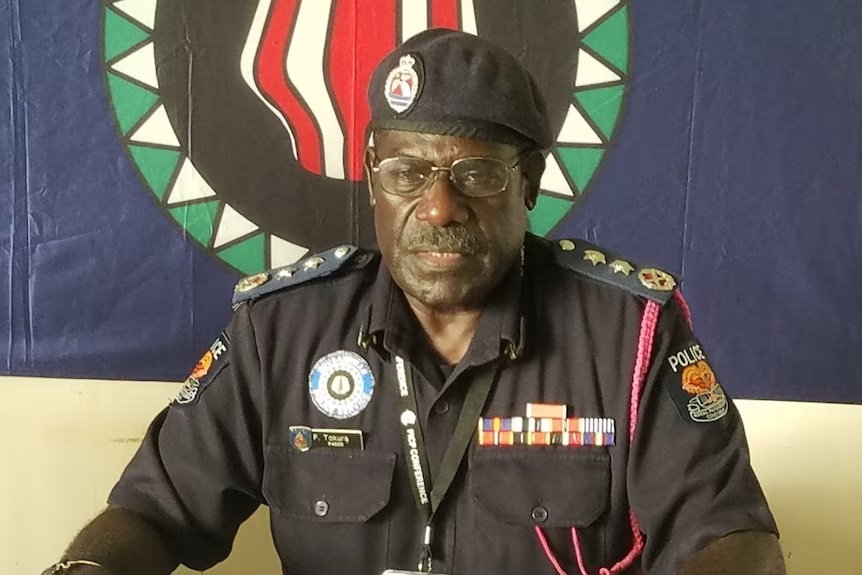A gang known as the “wanted boys” were allegedly armed by Bougainville police and carried out robberies for officers, who are now attempting to arrest the men for those crimes.
Chiefs and community leaders in the autonomous region in Papua New Guinea have called for the police officers to be investigated over their alleged involvement in organised crime.
“These policemen do all the planning and then engage the ‘wanted boys’ to carry out the main criminal holdups … even the firearms belong to them,” the leaders claim in a petition sent to the government.
Mike Piau is one of the “wanted boys”.
He said he was bashed up and arrested by police in 2020 when he refused to take part in a robbery.
“They almost shot me with a pistol. When I didn’t do what they asked, they turned on me and arrested me and beat me up,” he told the ABC.
“They would hide what they are doing and put me out to face harassment, and they wouldn’t face legal actions.”
The 40-year-old was taken into police custody in April this year but escaped after two days.
“I didn’t do anything wrong and kept asking why I was arrested and put in jail,” he said.
He has claimed that police have turned on him because they are worried, he will speak out.
“Are they worried I might say what they are doing illegally to authorities?”
Piau said the robberies, allegedly orchestrated by police, targeted foreign nationals and Papua New Guineans who travelled to Bougainville to buy guns and gold.
“They tell us to target outsiders and to rob them and send them off with nothing,” he said.
Piau told the ABC he had been approached by police because he was an influential resistance fighter during the Bougainville crisis from 1988 until 1998.
At the time, local dissatisfaction with a major mining project sparked an armed uprising against the PNG government in which 20,000 people died.
Other “wanted boys” the ABC has spoken with say they are now hiding out in villages to escape arrest.
A petition signed in August calls on police to stop “hunting down” the wanted boys, and for those already in custody to be released and pardoned, saying the men have pledged to cease all criminal involvement.
It also asks for the wanted boys to be offered rehabilitation.
Bougainville’s police chief Francis Tokura conceded it was likely some officers had been breaking the law.
“I’m aware of those allegations,” he told ABC.
“And I understand, yes, there is probably some element of evidence available to say, yes, there are a few of my members … who are involved in criminal activities.”
But he urged those making the claims to provide proof.
“We have a process that we use to investigate our own men and women if they commit crimes … and if we have sufficient evidence, we charge them,” he said.
“If you have evidence to show that this particular policeman was involved in whatever activity — illegal activity — you come forward and give me evidence, your written statement.
“If we don’t have evidence and we just suspend them, that is abuse of process too.”
Tokura said about four officers had already been dismissed from the Bougainville Police Service for misconduct.
“This is not something we’re trying to hide,” he said.
He said police did not have the authority to pardon the “wanted boys”, adding that community leaders had misinterpreted the term.
“It’s a general term that we use … a policing term, language that we use [to refer to] men or women who commit offences,” he said.
Piau said the alleged police misconduct could hurt Bougainville’s independence bid.
“These sort of men will create bigger problems which will impact our road to independence,” he told the ABC.
Despite the 2019 referendum, which was non-binding, Bougainville’s fate lies in the hands of the PNG parliament, which is yet to make a decision on the issue.
Gordon Peake, senior adviser on the Pacific Islands at the United States Institute of Peace, said the allegations should not be overblown.
“Clearly anything that puts Bougainville in a dim light will affect the island’s independence bid,” Dr Peake said.
“But the allegations would detract from the reality that Bougainville is one of the safest places in Papua New Guinea.”
Tokura said he had total faith in his team’s ability to serve an independent nation.
“The majority of Bougainvilleans support us. I can confidently say yes, we are ready,” he said.
PNG’s Minister for Internal Security and Member for Bougainville Peter Tsiamalili Jr did not respond to the ABC’s detailed questions on the issue.
The Bougainville Police Service is made up of about 200 sworn officers whose work is focused mainly around the three major towns of Arawa, Buka and Buin.
An additional 400 auxiliary police are based in villages.
Sinclair Dinnen, a researcher at the Australian National University’s Department of Pacific Affairs, said the service was small and somewhat under-resourced.
“The Bougainville Police Service still operates under the auspices of the Royal Papua New Guinea constabulary and is largely dependent on funding sort of coming through the PNG government system,” he said.
Dr Dinnen said there was some community mistrust in the police following the Bougainville crisis.
When tensions began to break out in the late 80s, the PNG police deployed mobile squads to the region.
They were later accused of serious human rights abuses.
“There’s a kind of memory of that other kind of policing, that Bougainvilleans did not want to duplicate or replicate,” Dr Dinnen said.
Dr Peake said Australia had a role to play in training the PNG police, which it has done for decades.
“I think Australia’s got a hefty task ahead of it when it comes to trying to reorient the PNG police, whether that be the PNG police in Bougainville, or the PNG police elsewhere in the country,” he said.
SOURCE: ABC/PACNEWS














